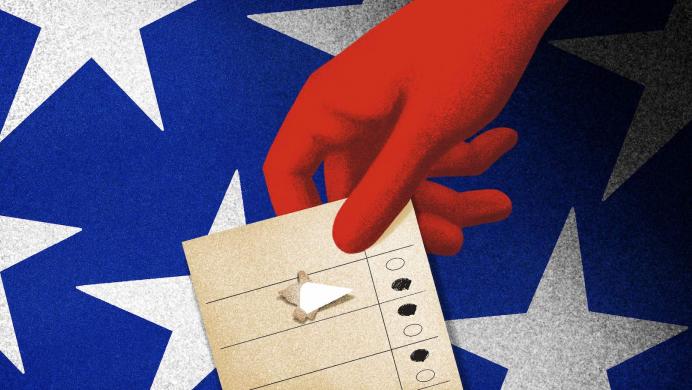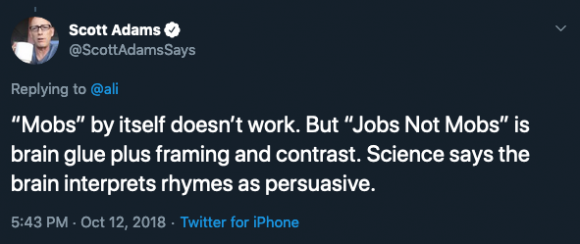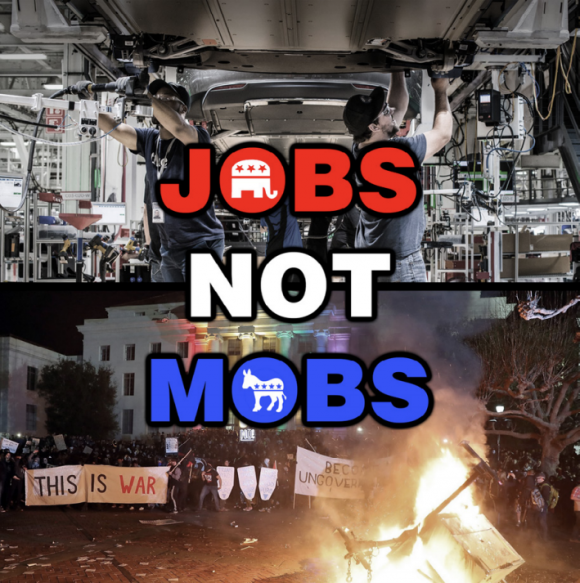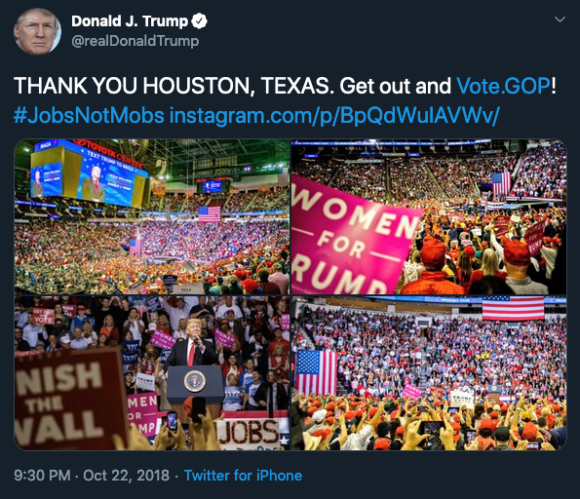

Viral Slogan: "Jobs Not Mobs"
Overview
The viral slogan “Jobs Not Mobs” was popularized on social media and conservative press in early October 2018, before official political adoption by President Donald Trump later that month. This campaign formulated through interactions between small social media accounts and influencers with large audiences, working together to popularize a meme linking the Democratic party to violent mobs, and Republicans to job growth. Originating in debate around breaking news events and the wedge issues of leftist street protest, immigration, and employment, Jobs Not Mobs was deployed as a hashtag and used alongside recontextualized imagery preceding the 2018 midterm elections.
STAGE 1: Manipulation Campaign Planning and Origins
Conservative politicians have long compared leftist street organizing and progressive social causes to mobs as a campaign tactic.1 The popularity of the phrase Jobs Not Mobs in 2018 builds upon this history of conservative political communication and President Trump’s style. There were several instances of pundits and politicians using “mob” to describe leftist and liberal social actions in 2018 that contributed to the rapid adoption of Jobs Not Mobs in October of that year.
In a June 27 Washington Times op-ed, commenting on reporting from Real Clear Politics, Tammy Bruce described Rep. Maxine Waters’ (D-Calif.) support for the anti-immigrant family separation “Keep Families Together” initiative as an encouragement of “mob action.” 2 During the highly publicized and controversial confirmation hearing of Supreme Court Justice Brett Kavanaugh in September, progressive activists organized several actions to protest Kavanaugh’s history of alleged sexual assault.3 These protests were described as an example of “mob rule” by Sen. John Cornyn (R-Texas).4 While promises of job growth have been a signature of both his campaign and presidency, the two words “jobs” and “mobs” were not initially linked together. Trump spoke of “left-wing mobs” at a rally and first tweeted “mobs” on October 6, 2018.5 Other prominent Republican figures like Sen. Mitch McConnell (R-Kentucky) and Sen. Marco Rubio (R-Florida) also adopted the phrase at this time.6
While the origin of the Jobs Not Mobs slogan stems from the 2018 campaign, the first direct use of the phrase in an American context was by Twitter account @TheRightWayNews in 2016, to little fanfare.7 Largely unnoticed at the time, this tweet is likely disconnected from the 2018 deployment. The Jobs Not Mobs campaign formalized around reactions to two CNN segments commenting on protestors confronting Rep. Ted Cruz (R-Texas) and his family at a restaurant, which aired on October 9. In one segment, host Don Lemon condemned conservative descriptions of protestors as a “mob.” In another, CNN host Brooke Baldwin criticized guest Matt Lewis’ use of “mob” as “the m-word.” That clip went viral.8
A clip of Brooke Baldwin’s was tweeted by @FreeBeacon on October 99 and retweeted by @trmcolarado10 with the commentary “Jobs not mobs! Results vs Resist! Rule of Law vs Chaos!” on October 10. This tweet has no interactions. On October 10, 2018, the official GOP Twitter account tweeted a video of a Trump rally, in which the president called the Democrats the “party of crime” and the Republican party “the party of jobs, jobs, jobs.”11
#JobsNotMobs was first used as a campaign hashtag in the early morning of October 11 by Twitter user @mightysprite1 in a retweet of the Trump rally footage12 , followed by a tweet by @hawgheaven.13 Later that morning, a “supercut” video was tweeted by journalist Andrew Kugle with text description: “reporters telling people to not use the "mob.”14 Twitter user @warriormama1019 replied “#JobsNotMobs. #VoteRed.”15 In a reply to a retweet of Kugle’s video by Chadwick Moore, user @johncharles replied with the phrase, “vote jobs, not mobs” which was praised as a slogan by several others in the replies.16 Throughout the day, several small Twitter accounts used the hashtag #jobsnotmobs in replies to the official GOP Twitter account, President Trump, Republican politicians, and conservative .17
On October 12, radio host Mark Simone tweeted, “Now that Democrats are angry mobs screaming in restaurants and in the streets, egged on by Holder, Hillary and Maxine Waters, while the President created the lowest unemployment rate in 50 years, how about the slogan “Vote for Jobs, not Mobs” #maga.”18 While various iterations were posited on social media and the use of the hashtag by small accounts largely ignored, Dilbert cartoonist Scott Adams popularized the pairing of jobs and mobs that day in a reply to a now-deleted Tweet by commentator Ali Alexander.19 Adams described the rhyming pairing of jobs and mobs as “brain glue.”
- 1Matt Viser and Robert Costa, “‘An Angry Mob’: Republicans Work to Recast Democratic Protests as out-of-Control Anarchy,” The Washington Post, accessed September 2, 2020, https://www.washingtonpost.com/politics/an-angry-mob-republicans-work-to-recast-democratic-protests-as-out-of-control-anarchy/2018/10/08/c8648e8a-cb13-11e8-a3e6-44daa3d35ede_story.html.
- 2Tim Hains, “Maxine Waters: ‘God Is On Our Side,’ If You See A Member Of Trump Cabinet, ‘Push Back,’” RealClear Politics, June 25, 2018, https://www.realclearpolitics.com/video/2018/06/25/maxine_waters_god_is_on_our_side.html; Tammy Bruce, “Maxine Waters Advances a Liberal Strategy with Her Call for Mob Action,” The Washington Times, June 27, 2018, https://www.washingtontimes.com/news/2018/jun/27/maxine-waters-advances-a-liberal-strategy-with-her/.
- 3Emily Witt, “How the Protests Against Brett Kavanaugh Reached the National Stage,” The New Yorker, September 30, 2018, https://www.newyorker.com/news/dispatch/how-the-kavanaugh-protests-reached-the-national-stage.
- 4“‘Mob Rule’ Rocks Senate Hearing for Judge,” BBC News, September 4, 2018, https://www.bbc.com/news/world-us-canada-45403324.
- 5Donald Trump (@realdonaldtrump), “You Don’t Hand Matches to an Arsonist, and You Don’t Give Power to an Angry Left-Wing Mob. Democrats Have Become Too EXTREME and TOO DANGEROUS to Govern. Republicans Believe in the Rule of Law - Not the Rule of the Mob. VOTE REPUBLICAN!,” , October 6, 2018, https://twitter.com/realDonaldTrump/status/1048745061888880640.
- 6Steve Brusk and Elissa Nuñez, “Republicans Have a New Name for Democrats: ‘Mob,’” CNN, October 7, 2018, https://www.cnn.com/2018/10/07/politics/republicans-trump-democrats-mob-kavanaugh/index.html.
- 7The Right Way News (@theRightWayNews), “#WereStillHere #AbsurdUltimatums 2016 Election Thank You Notes #NewTrumpCabinetPositions Dear Liberals #WhenIAmDownOnMyself #SelfEvaluations Https://T.Co/XPKwdcSrPv,” Twitter, November 12, 2016, https://twitter.com/TheRightWayNews/status/797422126412300288.
- 8Brian Flood, “CNN Stars Don Lemon, Brooke Baldwin Decide ‘Mob’ Is Too Harsh When Referring to Groups of Angry Protesters,” Fox News, October 10, 2018, https://www.foxnews.com/entertainment/cnn-stars-don-lemon-brooke-baldwin-decide-mob-is-too-harsh-when-referring-to-groups-of-angry-protesters; Malachi Bailey, “Watch: CNN Anchor Flips Out When Guest Uses ‘M-Word’ To Describe Protesters,” The Western Journal, October 10, 2018, https://www.westernjournal.com/watch-cnn-anchor-flips-guest-uses-m-word-describe-protesters.
- 9Free Bacon (@FreeBeacon), “Does Driving People out of Restaurants and Banging on the Supreme Court Walls Sound ‘Pretty Mobby’ to You? Https://T.Co/2fiIyzedXF,” Twitter, October 9, 2018, https://twitter.com/FreeBeacon/status/1049756082623733761.
- 10Turn CO Red (@trmcolorado), “Jobs Not Mobs! Results vs Resist! Rule of Law vs Chaos!,” Twitter, October 10, 2018, https://twitter.com/trmcolorado/status/1049917313317769216.
- 11GOP (@GOP), “‘Republicans Are the Party of Law, Order, and Justice—and We Are Also the Party of JOBS, JOB, JOBS.’—@realDonaldTrump in PA Https://T.Co/EZmVfRW8CT,” Twitter, October 10, 2018, https://twitter.com/GOP/status/1050167948470611968.
- 12mightysprite (@mightysprite1), “#JobsNotMobs Oops, Can’t Say Mobs.😂,” Twitter, October 11, 2018, https://twitter.com/mightysprite1/status/1050328266203115521.
- 13Danny East (@hawgheaven), “@GymCoachMac @pjbowles4 #JobsNotMobs,” Twitter, October 11, 2018, https://twitter.com/hawgheaven/status/1050349849860866049.
- 14Andrew Kugle (@andrewjkugle), “SUPERcut of Reporters Telling People to Not Use the ‘Mob’ Word Cut with Video of the Mob. Https://T.Co/O2tgNZMEv5,” Twitter, October 11, 2018, https://twitter.com/AndrewJKugle/status/1050394308568854528.
- 15WarriorMama (@warriormama1019), “@AndrewJKugle #JobsNotMobs. #VoteRED,” Twitter, October 11, 2018, https://twitter.com/warriormama1019/status/1050571976052371456.
- 16Mildly Ambivalent (@johncharles), “@Chadwick_Moore Vote Jobs, Not Mobs!,” Twitter, October 11, 2018, https://twitter.com/johncharles/status/1050505421255917568.
- 17@MattyC2213, “@GOP @realDonaldTrump #JOBSnotMOBS,” Twitter, October 11, 2018, https://twitter.com/MattyC2213/status/1050387617920012288; Danny East (@hawgheaven), “@GymCoachMac @pjbowles4 #JobsNotMobs.”
- 18Mark Simone (@MarkSimoneNY), “Now That Democrats Are Angry Mobs Screaming in Restaurants and in the Streets, Egged on by Holder, Hillary and Maxine Waters, While the President Created the Lowest Unemployment Rate in 50 Years, How about the Slogan ‘Vote for Jobs, Not Mobs’ #maga,” Twitter, October 12, 2018, https://twitter.com/MarkSimoneNY/status/1050812959113601024.
- 19Scott Adams (@ScottAdamsSays), “@ali ‘Mobs’ by Itself Doesn’t Work. But ‘Jobs Not Mobs’ Is Brain Glue plus Framing and Contrast. Science Says the Brain Interprets Rhymes as Persuasive.” Twitter, October 12, 2018, https://twitter.com/ScottAdamsSays/status/1050864515594604545; “Scott Adams on Twitter: "‘Mobs’ by Itself Doesn’t Work. But “Jobs Not...,” archive.is, October 13, 2018, http://archive.is/qiQwQ.
STAGE 2: Seeding Campaign Across Social Platforms and Web
Unlike some manipulation campaigns, Jobs Not Mobs planning and seeding was a distributed process, as it was iterated publicly over time on Twitter. Adams’ tweet on October 12 marks the end of the discursive planning and formalization process that played out on Twitter, and his post was then seeded across other platforms. That same day, the tweet was screenshotted, hosted on imgur with the caption “You heard him boys, let's spread JOBS NOT MOBS far and wide!” and subsequently posted in the_donald subreddit.1
On October 13, a campaign participant on the_donald created and posted a meme,2 juxtaposing two images: a photo of Tesla assembly line workers used by the company on its pages,3 and a chaotic image of Berkley protests from February, 2017.4 A template for the meme, with the stylized “Jobs Not Mobs” text was hosted on imgur and shared below the original post.5 Participants on the_donald praised the slogan, and were instructed by operators to spread it further on social media, thus starting the meme war. The slogan, hashtag, and meme format then saw a large spike in use on Twitter, , and after Adams’ tweet was posted and popularized on the_donald.6
A networked faction of conservative influencers began adopting the slogan and hashtag. It was seeded on anonymous message boards in the following days and traded up the chain. Student for Trump co-founder Ryan Fournier used the phrase on October 137 , and actor James Woods first used the hashtag that day.8 The slogan and original meme were also introduced to ’s /pol/ board on October 13, with the suggestion, “The smart meme bucks are riding the Jobs Not Mobs wave this election cycle.”9 Simultaneously, the hashtag was shared on ’s Q research board, a major hub of QAnon organizing activity.10 Fox & Friends first mentioned the slogan on October 15 in a segment titled “Jobs Not Mobs.”11 Actor Charlie Kirk and cartoonist Ben Garrison used the slogan on October 14,12 actor Scott Pressler and pundit Laura Ingraham on October 15.13
On October 17, YouTube account “Trump 2020” uploaded an unofficial campaign-styled video named “Jobs Not Mobs.”14 The content of the video was divided into two segments: “The GOP’s America,” showcasing video clips of industry and economic prosperity, and “The Left’s America,” clips of protests and Democratic politicians. The next day, October 18, President Trump tweeted #JobsNotMobs for the first time.15 On October 19, activist and conspiracist Jack Posobiec accelerated the seeding campaign, instructing followers to “get it trending.”16 Within the hour, QAnon account @inthematrixxx used the hashtag alongside other hashtags associated with the QAnon movement.17 On October 20, the “Jobs Not Mobs” YouTube video was reuploaded to Twitter by an account named “JFord1984, presumably the same operating the “Trump 2020” YouTube channel. This video, which to date has generated 2 million-plus views, was tweeted at President Trump and other conservative influencers and continually reuploaded by others.18
The slogan generated additional conversation at this time on the_donald, /pol/, and qresearch. It was accompanied on all platforms by sentiment critical of Democratic policy, Democratic leaders, and, in some cases, overt racism and xenophobia. After seeding among conservative media and far-right message boards, The Daily Stormer praised the slogan in an article on October 20.19 The wide scale adoption of “Jobs Not Mobs” across all sectors of the MAGA coalition marked the end of a successful seeding process.
- 1“You Heard Him Boys, Let’s Spread JOBS NOT MOBS Far and Wide!,” Imgur, October 12, 2018, https://imgur.com/m9qU6dE; , search term: "Jobs Not Mobs;" dates searched: September 30th - October 12th, 2018; https://redditsearch.io/?term=%22Jobs%20not%20Mobs%22&dataviz=false&aggs=false&subreddits=&searchtype=posts,comments&search=true&start=1538366400&end=1539403200&size=100.
- 2“JOBS NOT MOBS : The_Donald,” archive.org, accessed September 3, 2020, https://web.archive.org/web/20190117201307if_/https://www.reddit.com/r/The_Donald/comments/9nq3kp/jobs_not_mobs/.
- 3“Jobs at Tesla,” Tesla Motors, accessed September 10, 2020, https://www.tesla.cn/en/careers.
- 4Michael Bodley, “At Berkeley Yiannopoulos protest, $100,000 in damage, 1 arrest,” San Francisco Chronicle, February 2, 2017, https://www.sfchronicle.com/crime/article/At-Berkeley-Yiannopoulos-protest-100-000-in-10905217.php.
- 5“Jobs Not Mobs,” Imgur, October 12, 2018, https://imgur.com/a/iKnejZJ.
- 6Ben Schreckinger, “How an internet meme became a Trump campaign slogan slogan,” Politico, October 31st, 2018, https://www.politico.com/story/2018/10/31/trump-jobs-not-mobs-slogan-origin-twitter-reddit-949718.
- 7Ryan Fournier (@RyanAFournier), “Hey Liberals: Jobs not Mobs.,” Twitter, October 13, 2018, https://twitter.com/RyanAFournier/status/1051210930925838337.
- 8James Woods (@RealJamesWoods), “#JobsNotMobs #MoneyHoney,” Twitter, October 13, 2018, https://twitter.com/RyanAFournier/status/1051210930925838337.
- 9Anonymous, “/pol/ - Politically Incorrect » Thread #189270340,” 4chan, October 13, 2018, accessed via 4plebs, http://archive.4plebs.org/pol/thread/189270340/#189276094.
- 10Anonymous, “War Room,” 8kun, October 13, 2018, https://8kun.top/qresearch/res/3464257.html#3464860.
- 11FOX & Friends, FOX News, October 15, 2018, https://archive.org/details/FOXNEWSW_20181015_100000_FOX__Friends/start/1080/end/1140.
- 12Charlie Kirk (@charliekirk11), “GREAT AGAIN: Unemployment has never been this low for a non-wartime president...,” Twitter, October 14, 2018, https://twitter.com/charliekirk11/status/1051357153556975617.
- 13Scott Presler (@ScottPresler), “Elizabeth Warren is 1/1024 Native American...,” Twitter, October 15, 2018, https://twitter.com/ScottPresler/status/1051904127431790592; Laura Ingraham (@IngrahamAngle), “Hey Virginia’s 7th District, choose safety and prosperity over anger and chaos...,” Twitter, October 15, 2018, https://twitter.com/IngrahamAngle/status/1051972511355887617.
- 14Anonymous, “JOBS NOT MOBS,” , October 17, 2018, https://www.youtube.com/watch?v=-kwPjrTsV4k.
- 15Donald J. Trump (@realDonaldTrump), “#JobsNotMobs!,” Twitter, October 18, 2018, https://twitter.com/realDonaldTrump/status/1053124336637247493.
- 16Jack Posobiec (@JackPosobiec), “Get it Trending! #JobsNotMobs,” Twitter, October 19, 2018, https://twitter.com/JackPosobiec/status/1053258691171008513.
- 17In The Matrixxx (@intheMatrixxx), “These two drops are telling us what is going on RIGHT NOW...,” Twitter, October 19, 2018, https://twitter.com/intheMatrixxx/status/1053264417490649088.
- 18Trump 2020 (@JFord1984), “JOBS NOT MOBS!,” Twitter, October 20, 2018, https://twitter.com/JFord1984/status/1053801611514892288.
- 19Andrew Anglin, “Trump’s Closing Midterm Message: Kavanaugh and Caravans,” The Daily Stormer, October 20, 2018, https://dailystormer.su/trumps-closing-midterm-message-kavanaugh-and-caravans/.
STAGE 3: Responses by Journalists, Activists, Etc.
President Trump used the #JobsNotMobs hashtag 10 times between October 18 and October 31, shared as text and paired with embedded media. On October 31, he used the hashtag to share the “Jobs Not Mobs” unofficial campaign video from YouTuber Trump 2020.1 While the planning and seeding of the campaign was carried out by an array of conservative influencers, Trump’s adoption of the phrase helped it spread rapidly and granted official legitimacy to its use by supporters. Major political stakeholders tweeted their support, including former House Speaker Newt Gingrich, who commented that it was “a nice, clean formula.”2
Trump’s adoption of “Jobs Not Mobs” online and at campaign rallies not only increased social media use, but also generated significant media exposure. A variation of the phrase was used in the segment: “The Trump administration is focusing on what Americans really care about. Not mobs, but jobs!” On October 20, Fox & Friends used the slogan again, in a segment titled “Trump Doubles Down On “Jobs Not Mobs” Slogan.”3 This was followed by another Fox segment titled “‘Jobs not mobs’ Trump unveils new midterm message” on October 24. Numerous other smaller conservative and right-wing publications like Breitbart,4 The Daily Caller,5 The Daily Wire,6 The Gateway Pundit,7 Real Clear Politics,8 and The Epoch Times9 all covered the viral slogan and its official use by President Trump.
Critical press from mainstream outlets quickly followed Trump’s popularization of the slogan. Bustle, Politico and The New York Times published articles tracking the slogan’s spread and eventual adoption by the president.10 Politico interviewed campaign participants Danny East, a Twitter user credited with the early use of the #JobsNotMobs hashtag, and “Bryan Machiavelli,” a reddit user credited with developing the “Jobs Not Mobs” meme template. In November Newsweek and Splinter published two interviews with “Jobs Not Mobs” video creators.11 While no investigations uncovered evidence of additional coordination, or a direct explanation of how the phrase and materials were officially adopted by Donald Trump, these reports critiqued the framing of leftist organizing, progressive and liberal politicians, and migrants as “mobs,” and also fact-checked President Trump’s claims of job growth in the US.
- 1Donald J. Trump (@realDonaldTrump), “#JOBSNOTMOBS! VOTE REPUBLICAN NOW!!,” Twitter, October 31, 2018, https://twitter.com/realDonaldTrump/status/1057715198684000258.
- 2Ben Schreckinger, “How an internet meme became a Trump campaign slogan slogan,” Politico, October 31st, 2018, https://www.politico.com/story/2018/10/31/trump-jobs-not-mobs-slogan-origin-twitter-reddit-949718.
- 3“Trump doubles down on 'jobs not mobs' slogan,” Fox News, October 20, 2018, https://video.foxnews.com/v/5851340079001#sp=show-clips.
- 4Joel B. Pollak, “Exclusive: Scott Adams Predicts ‘Greatest Turnout by Republicans, Maybe Ever’ in Midterms,” Breitbart, October 19, 2018, https://www.breitbart.com/midterm-election/2018/10/19/exclusive-scott-adams-predicts-greatest-turnout-by-republicans-maybe-ever-in-midterms/.
- 5Scott Morefield, “‘Jobs Not Mobs’ - Latest Trump Campaign Ad Lays Out 2 Striking Visions For America,” Daily Caller, October 31, 2018, https://dailycaller.com/2018/10/31/jobs-not-mobs-trump-ad/.
- 6The Daily Wire, “Trump Selling Jobs Not Mobs Big Time,” YouTube, October 22, 2018, https://www.youtube.com/watch?v=AWJ4GR1kRwE.
- 7Jim Hoft, “Sen. Lindsey Graham: Democrat Mob Spit on Me During Kavanaugh Hearing,” Gateway Pundit, October 16, 2018, https://www.thegatewaypundit.com/2018/10/sen-lindsey-graham-democrat-mob-spit-on-me-in-capitol-building-during-kavanaugh-hearing-video/.
- 8Ian Schwartz, “Trump Twitter Ad: “Jobs Not Mobs”, RealClear Politics, October 31, 2018, https://www.realclearpolitics.com/video/2018/10/31/trump_twitter_ad_jobs_not_mobs.html.
- 9“Videos of the Day: Trump on Democrats, Borders, Migrant Caravan, and Welfare,” Epoch Times, October 21, 2018, https://www.theepochtimes.com/videos-of-the-day-trump-on-democrats-borders-migrant-caravan-and-welfare_2695268.html.
- 10Caroline Burke, “How Trump’s “Jobs Not Mobs” Hashtag Is Making Its Way Into His Rallies Now,” Bustle, October 23, 2018, https://www.bustle.com/p/trumps-jobs-not-mobs-hashtag-is-his-latest-jab-at-democrats-now-its-showing-up-at-rallies-12797688; Ben Schreckinger, “How an internet meme became a Trump campaign slogan slogan,” Politico, October 31st, 2018, https://www.politico.com/story/2018/10/31/trump-jobs-not-mobs-slogan-origin-twitter-reddit-949718; Keith Collins and Kevin Roose, “Tracing a Meme From the Internet’s Fringe to a Republican Slogan,” The New York Times, November 4, 2018, https://www.nytimes.com/interactive/2018/11/04/technology/jobs-not-mobs.html.
- 11Jessica Kwong, “Donald Trump Lifted ‘Jobs Not Mobs’ Ad From Anonymous YouTube User Who Says He Was Sick of Seeing GOP Efforts ‘Flounder,’” Newsweek, November 1, 2018, https://www.newsweek.com/donald-trump-lifted-jobs-not-mobs-ad-anonymous-youtube-user-motivated-seeing-1197759; Sophie Weiner, “That Wild ‘Jobs Not Mobs’ Video Trump Tweeted Was Taken From an Anonymous GOP Fan,” Splinter, November 2, 2018, https://splinternews.com/that-wild-jobs-not-mobs-video-trump-tweeted-was-taken-f-1830171490.
STAGE 4:
During early November, in the run up to the 2018 midterm elections, “Jobs Not Mobs” and “Jobs vs Mobs” became a frequent talking point in right-wing media, a ubiquitous hashtag on Twitter, and visible in official campaign signs at rallies; however, the phrase rapidly fell out of popularity post-election. As the phrase did not violate platforms’ terms of service, and no compelling evidence of artificial amplification of the phrase was found, no mitigation efforts by platform companies were taken.
STAGE 5: Adjustments by Manipulators to New Environment
Though somewhat absent on Twitter in 2019, “Jobs Not Mobs” has recently enjoyed a mild resurgence. In July, 2020, conservative influencers such as Eric Trump redeployed the hashtag, using it more frequently to promote President Trump’s re-election campaign on social media.1 Scott Adams, now a Trump campaign organizer, tweeted, “#jobsnotmobs is a nearly unbeatable campaign slogan in 2020. Contrast is persuasive, and this one rings true.”2 A July 2020 article on Real Clear Politics suggested the slogan should be readopted,3 and many social media users used the #JobsNotMobs hashtag to critique unrest in cities around the US in the wake of Black Lives Matter protests. Rather than adjust the viral slogan to mitigation efforts by social media platforms, “Jobs Not Mobs” use has been readjusted to new political issues and campaigns.
- 1Eric Trump (@EricTrump), “JUNE JOB NUMBERS EXCEED EXPECTATIONS BY 1.6 MILLION JOBS!!!...,” Twitter, July 2, 2020, https://twitter.com/EricTrump/status/1278671732166078466.
- 2Scott Adams (@ScottAdamsSays), “#jobsnotmobs is a nearly unbeatable campaign slogan in 2020...,” Twitter, July 16, 2020, https://twitter.com/ScottAdamsSays/status/1283875004367532032.
- 3Adriana Cohen, “Jobs Not Mobs,” RealClear Politics, July 3, 2020, https://www.realclearpolitics.com/articles/2020/07/03/jobs_not_mobs_143609.html.
Cite this case study
Joan Donovan and Brian Friedberg, "Viral Slogan: "Jobs Not Mobs"," The Media Manipulation Case Book, March 24, 2021, https://casebook-static.pages.dev/case-studies/viral-slogan-jobs-not-mobs.



